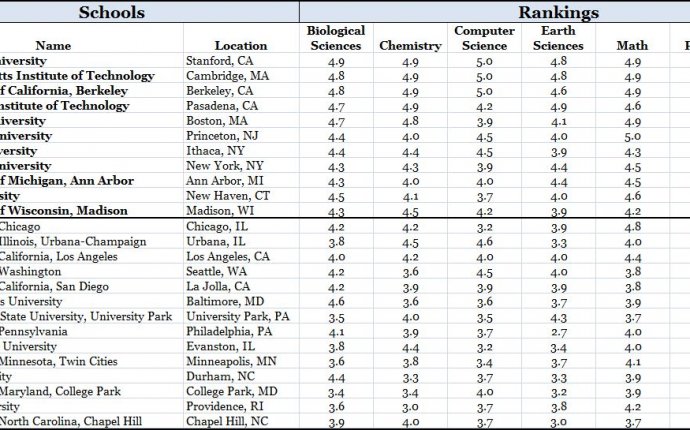
Top Physics Schools undergraduate
 Written by: Erik Hinrichsen•edited by: Elizabeth Wistrom•updated: 4/5/2012
Written by: Erik Hinrichsen•edited by: Elizabeth Wistrom•updated: 4/5/2012
Students looking for more information about the top physics schools should look here. This article is a ranking and description of the top ten physics programs.
- Physics is generally agreed to be the most difficult major in college. While physics is certainly hard enough at even small, no-name institutions, top undergraduate physics programs can be downright daunting. Nearly every student in these programs is brilliant, and the ones who aren't typically don't make it much further than their freshman year before they change majors. The purpose of this warning is just to remind readers that getting into these schools is the easy part; graduating with a degree in physics is not a given!
That being said, students at top undergraduate programs in physics have some wonderful advantages. They often benefit from excellent teaching at the hands of some of the top physicists in the world. Unlike other fields, most of the best physicists stay in academia and research. This means that students at these top-ranked schools are likely to study under some giants in the field.
-
Top Ten Physics Undergrad Programs
These rankings of the top undergraduate physics programs are fairly fluid, as it is not easy to determine just what makes one school better than any other. As a rule of thumb, any school in the top ten is definitely excellent, and is not appreciably "better" than other highly-ranked schools. Any one of these schools will prepare students for a career at the top of physics.
- Massachusetts Institute of Technology (MIT), Cambridge, MA. MIT has a well-deserved reputation as a world leader in physics. Many leading physicists have taught and researched there, and eight faculty members have won Nobel prizes in physics.
- Stanford University, Stanford, CA. Three current faculty members at Stanford are Nobel prize winners, and much important research has been conducted there. Arthur Leonard Schawlow shared the Nobel Peace Prize in 1981, while he was a professor at Stanford.
- Harvard University, Cambridge, MA. Harvard's physics department is over 120 years old, having been founded in 1884. Many physics students are Harvard concentrate in two subjects due to loose credit requirements.
- California Institute of Technology (Cal Tech), Pasadena, CA. The physics program at Cal Tech is excellent, and entrance is highly competitive. Much cutting edge research is published by Cal Tech professors each year.
- Princeton University, Princeton, NJ. Princeton prides itself on its long tradition of excellence and association with famous figures in the world of physics, including Albert Einstein. The program focuses on teaching students research skills.
- Cornell University, Ithaca, NY. The physics program at Cornell has a distinct focus on theoretical astrophysics and ultra-low temperature physics, which have resulted in Nobel Prizes for faculty.
- University of California-Berkeley, Berkeley, CA. Berkeley's physics program stresses the practical and theoretical sides of physics. Nine Berkeley professors have been awarded Nobel Prizes in physics.
- University of Illinois- Urbana Champaign, Urbana Champaign, IL. This excellent physics program is also the least expensive on the list, at least for Illinois residents. This large public university has one of the country's largest physics departments, so students won't lack for opportunities.
- University of California-Santa Barbara, Santa Barbara, CA. A combination of small class size and excellent professors gives UCSB its excellent reputation in physics.
- University of Chicago, Chicago, IL. Boasting a history achievement, with many Nobel prizes in physics, Chicago prides itself on its focus on research.
- These schools are all excellent, but students should not limit themselves to this list. Many universities and colleges have good physics programs, and it may be easier to stand out at smaller programs. This can be advantageous when applying to graduate schools, which most physics majors ultimately attend.
-
Sources
Top Ten Ranked Physics Universities:
US News Rankings of Physics programs:











